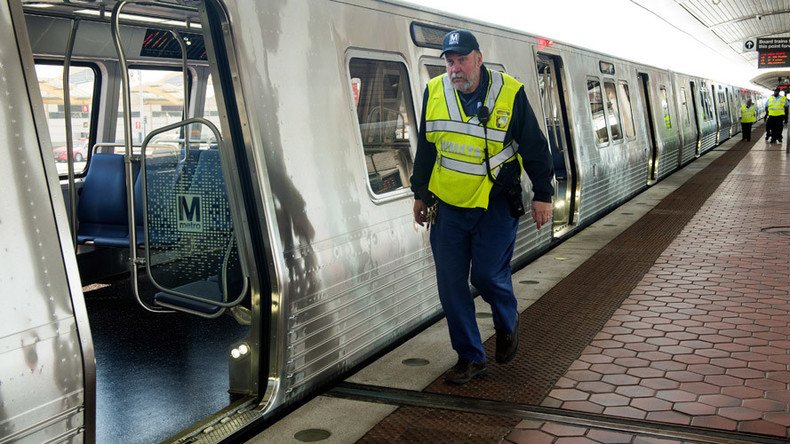DC Metro to shut down Wednesday for emergency safety inspection

The entire Washington, DC Metrorail will shut down for 29 hours beginning at midnight for an emergency inspection of electric cables a day after a fire caused massive disruptions throughout the system.
The Washington Metropolitan Area Transit Authority (WMATA) will inspect approximately 600 jumper cables throughout the system, new General Manager Paul Wiedefeld said in a statement.
DC officials discuss unprecedented full-scale #MetroShutdown of rail service due to potential for deadly accident. pic.twitter.com/tNCK7AebIN
— Manuel Rapalo (@Manuel_Rapalo) March 15, 2016
“While the risk to the public is very low, I cannot rule out a potential life safety issue here, and that is why we must take this action immediately,” he said. “When I say safety is our highest priority, I mean it. That sometimes means making tough, unpopular decisions, and this is one of those times. I fully recognize the hardship this will cause."
Metro officials described the shutdown as "unprecedented."
“Other than weather conditions, where we have closed down before, this is the first time we’ve closed for non-weather conditions,” a board member said.
All Metrorail service will be suspended Wed., March 16, for emergency inspections: https://t.co/OPr8Ia6Vgt#wmatapic.twitter.com/YEXPL1cm2s
— Metro (@wmata) March 15, 2016
A cable fire broke out in a tunnel at McPherson Square station about an hour before Metro was set to open on Monday. The station was temporarily closed, and Blue and Orange Line trains single-tracked between Foggy Bottom and Federal Triangle stations through the evening rush hour, while Silver Line trains turned back at Ballston.
Disappointing it’s come to this but ppl depend on the safety of Metro. Glad new #WMATA management is treating safety w/ a sense of urgency
— Mark Warner (@MarkWarner) March 15, 2016
The electrical fire began due to a malfunction in the jumper cables that bridge a gap in the electrified third rail, Wiedefeld told the Washington Post.
“Basically, the older cables, where they connect to the third rail, something happened ‒ a short circuit; I don’t know what the official term is ‒ and it caused the condition of the flare-up, which caused the fire in the actual cables,” he said.
The cables were the same type that caught fire in January 2015 near L’Enfant Plaza, when a similar “short circuit” caused electrical “arcing.” Smoke quickly filled the tunnel and the station, killing one woman and sickening scores of others.
BREAKING: WMATA releases Wednesday’s metro schedule for all six lines. pic.twitter.com/xcjwoD7yKy
— kglobal (@kglobaldc) March 15, 2016
The fire occurred on jumper cables that had been inspected since the L’Enfant incident, Wiedefeld told reporters during a Tuesday afternoon press conference. The upcoming inspection will look for any wear-and-tear and metal-on-metal issues.
DC-area residents, long used to expressing their frustration with the beleaguered system on Twitter, quickly took to social media to share their gallows humor about the closure.
WMATA is working with the federal government, but will make their own decision, Wiedefeld said.
The federal government announced that workers will have the option to take unscheduled leave or to telework.
3/16: Due to metro closure, Fed agencies in DC have option for unscheduled leave/telework →
— OPM (@USOPM) Mar 15 2016
“Alternate service options throughout the region will be extremely limited, and severe crowding is expected on buses. The public is advised to make alternate travel arrangements as early as possible,” WMATA warned.
While customers anticipate that ride-sharing service Uber will institute surge charges, its rival Lyft is offering new passengers $20 off if they use the code METROHELP, WRC reported.
.@justin_fenton#Uber (and #Lyft?) drivers all over #WashingtonDC when #WMATA shuts down tomorrow. pic.twitter.com/YHrwCh4aFP
— Dr. Midnight (@das_waffelhaus) March 15, 2016
The move comes just ahead of the start of the annual Cherry Blossom Festival, which brings millions of tourists flooding into DC, many of whom rely on Metrorail. The system had promised not to conduct any track work for five straight weekends to deal with the crush of passengers.
“From where I sit the safety of the public and my employees is paramount,” Wiedefeld said when asked why the safety inspection could not wait until the weekend.
Uber is really capitalizing on the fact that the metro will be closed tomorrow:
— Lindsey Kolb (@lindsey_kolb) Mar 15 2016
However, a full shutdown could have been avoided if the board had decided to conduct the safety checks over six days, said a Metro official, according to the Washington Post. With full support from Wiedefeld, they opted not to take that route, though, because of concern about Metro’s liability if something were to happen before the safety checks were complete.
Closures could be extended if potentially dangerous cables are found so that they can be repaired.












